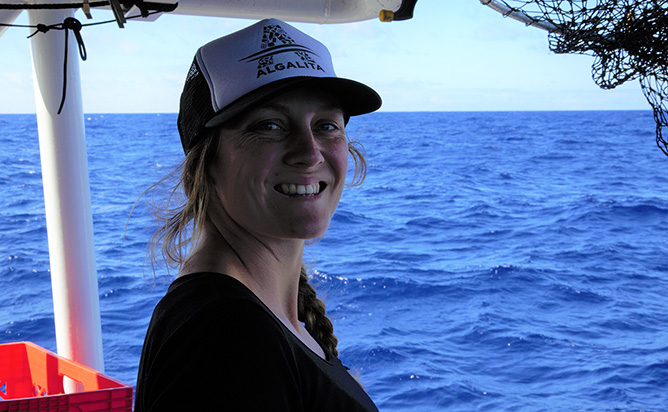Raquelle de Vine
Raquelle de Vine’s career is all at sea – in a good way. The Bachelor of Sustainability and Outdoor Education graduate is the oceanographic research vessel co-ordinator for California-based Algalita Marine Research and Education.

Algalita is a leader in the global movement to end plastic pollution and Raquelle’s most recent research took her around the Pacific. During the six-month voyage, she and the team visited the Galapagos Islands, Rapa Nui, Robinson Crusoe Island and the coast of Chile from Valparaiso to Arica.
For Raquelle, the opportunity to contribute to the organisation’s work is enormously fulfilling, especially given that the issue of plastic pollution became a focus for her during her studies at Ara. “That’s where my passion to work in this area bloomed,” she says.
Raquelle says her degree set her up well for the work. “It gave me knowledge and understanding of ocean conservation issues and taught me how to think abstractly about these issues and about actions to address them. It also equipped me with the skills to work in a small, close-knit team environment, plus I gained many practical skills like rock climbing, kayaking, rope work and navigation.”
Raquelle loved the variety and choices offered during her degree. “You get the opportunity to specialise in a particular area or keep your interests broad. This is a really important factor in allowing students to develop enough skills and knowledge to guide them into a career without restricting what they can pursue. I have classmates who are nature photographers in Africa, teachers in London, DOC workers and glacier guides in New Zealand and ski patrollers in Canada.”
Persistence helped Raquelle secure her job with Algalita. She made contact with them, saved up to travel to the US to volunteer for them and, once back in New Zealand, frequently emailed them about further opportunities. “So when they were looking for crew for the 2016/17 expedition they offered me a position.”
Her work consists of designing and implementing research and education programmes for the vessel, writing grant applications, sourcing funding, recruiting and training crew, facilitating programmes and hosting researchers and scientists during expeditions. “My goal is to develop ways to utilise the vessel to its fullest potential.”